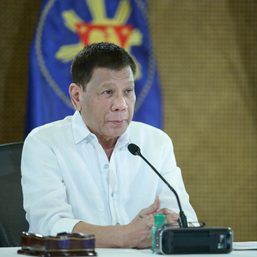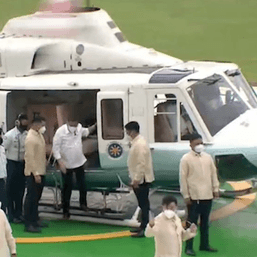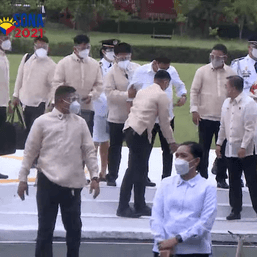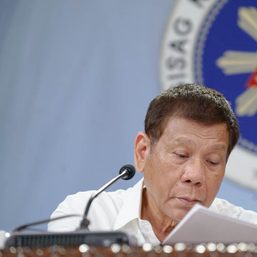SUMMARY
This is AI generated summarization, which may have errors. For context, always refer to the full article.
![[OPINION] Presidential inability and its many forms](https://www.rappler.com/tachyon/2021/04/TL-presidential-inability-April-17-2021-sq.jpg)
One year ago, you hear stories of someone suffering from COVID. Today, it is at everyone’s door. In fact, we have been waking up to messages about people we know (not strangers) dying/getting sick of COVID. In the middle of all this suffering, the President told the nation in a recorded address: “Matagal pa ‘to. Sabihin ko sa ‘yo, marami pang mamamatay dito (This is far from over. Let me tell you, many more will die here).”
As a people, we have suffered this for more than a year now. We have given everything they needed. We have lost so much. And to what result? Here’s his answer: “When will we have that stock sufficient to vaccinate the people? I really do not know. Nobody knows.”
Just this March, the President placed the National Capital Region and surrounding areas under ECQ again, forcing citizens to stay home and avoid gatherings. After locking down NCR, he then promptly flew to Davao to celebrate his birthday.
Around that time, 200 Chinese ships were massing in Julian Felipe Reef – well within Philippine jurisdiction. Alarmed, the Secretary of Foreign Affairs issued strong statements. The Secretary of Defense followed with something sterner, stating “I am no fool” in response to China’s claim that the ships were just “seeking shelter.”
As Filipinos died in hospital driveways and tents, and the Chinese ships lingered, the President extended his absence for two weeks. He resurfaced on TV with this explanation: “Noong nawala ako ng ilang araw, talagang sinadya ko ‘yun. Ganoon ako eh, kapag kinakalkal mo ako, lalo ako ‘yung…parang bata (When I went missing for a few days, that was deliberate. That’s just the way I am, if you mess with me, I’ll do it more…like a child).” He then spent time attacking Senator De Lima but, was conspicuously silent about the creeping “incursion” of China.
All of these have given rise to questions on whether we are consigned to this fate for the next 12 months. Or as one person asked, “Can we even last until December?”
The Constitution does have something to say about it. And I’ve seen multiple discussions crop up online. The relevant provisions fall under Article VII, specifically Section 8 [death, permanent disability, removal, resignation] Section 11 [Inability] and, Section 12 [Serious illness].
Section 8 says: “In case of death, permanent disability, removal from office, or resignation of the President, the Vice-President shall become the President to serve the unexpired term.” It covers the constitutional line of succession.
On the other hand, Section 11 states, “Whenever a majority of all the Members of the Cabinet transmit to the President of the Senate and to the Speaker of the House of Representatives their written declaration that the President is unable to discharge the powers and duties of his office, the Vice-President shall immediately assume the powers and duties of the office as Acting President.”
And then there is Section 12 which covers “serious illness,” which was the primary topic of the recent ruling of the Supreme Court on whether the President can be compelled to disclose his state of health. While it has become a national pastime to speculate about his state of health, it is overlooked that Section 8 and 11 are not triggered by a prior disclosure or health bulletin.
The swagger of 2016 has lost its luster. It has become tiresome and insensitive remarks only serve to call even more attention to his competence.
But what does presidential inability even mean? Some commentators in the US refer to it as “competency,” others use “incapacity.” While Section 8 has a list, Section 11 seems fluid. It seems in the wisdom of the framers of the 1987 Constitution, it was best to leave it at that. What appears is that by assigning a specific item for Serious Illness (Section 12), the framers clearly intended Section 11 to operate on a different, more adaptable plane.
We saw this when the US Capitol was besieged by Trump supporters. Politicians from both sides looked at an analogous provision in the US Constitution (25th Amendment) fearing further danger from Trump even if he was set to exit in just 10 days. Under their Constitution the process must be triggered by Vice President Pence and a majority of the Cabinet. In our Constitution, it is solely in the hands of the Cabinet. Of course, political realities explain why Section 11/25th Amendment has rarely, if ever, been invoked. And that is only proper. Stability of government is crucial. But the confluence of an out-of-control pandemic and a looming “invasion” in our seas creates a potent mix that tests every theory of governance – and the nation’s patience.
Despite saying he suffers from several severe ailments, the President seems confident he can continue to perform the functions of his office. So that covers the health aspect (Section 12). How about Section 11? The starting point is that the Executive function must be wielded BY the President himself. It is a personal commitment. As Justice Carpio said in a recent interview, there is no substitute for the President speaking up (about China). An alter ego (ie Cabinet member) only takes direction from the President. He cannot substitute his discretion, if the Chief Executive is unable.
Over the past year, it has become a curious spectacle to see the President limited to a weekly and sometimes pre-recorded address. Some of these addresses appear to have been edited. When a nation is under severe crisis on two fronts, the Chief Executive must lead after saying “all hands on deck.” To realize that in the few times that the President manages to go on air, someone is editing what he says is a “constitutional curiosity” to say the least.
The uncertainty also creates severe complications with grave consequences. For instance, by his “silence,” the President is (unwittingly) proving to be the greatest asset of the Chinese government, who as Justice Carpio pointed out, senses their “window of opportunity” closing. The success of these last-minute “land grabs” before the President steps down depends on his continued equivocation. On the pandemic, there were times when the different heads gave conflicting statements causing confusion, leading ex-VP Binay to ask if they had a “group chat.” Clarity of direction in a timely fashion is only possible if the captain is not asleep – or at least can stay awake most of the time.
That there is even a need for periodical “proof of life” photos makes things worse. We are in a once-in-a-century crisis. People are dying. Businesses are closing. To get out of this swamp, we need a leader who can stay focused for hours. Not someone who has to prove he can still “jog” every couple of weeks. Fanaticism and bravado cannot defeat mounting deaths and hunger. That’s why the “Sinadya ko ‘yun (It’s deliberate)” – disappearing for two weeks – remark, earned ridicule and exasperation. The swagger of 2016 has lost its luster. It has become tiresome and insensitive remarks only serve to call even more attention to his competence.
And on that note, as a legal question, is incompetence on a massive scale a form of inability? The Constitution does not say. Section 11 leaves it to the judgment of the people it mentions. Business owners might ask, “Is there even a difference?!?” While the man on the street would say, “Pilosopo talaga mga abogado (Lawyers are really smart alecks).” And yet, with a Chinese “fleet” sitting just off Palawan, and thousands dying, the argument becomes academic. There is nothing hypothetical about seeing a loved one gasp on a hospital driveway. Perhaps the real question is, how much incompetence can we afford to continue to suffer? – Rappler.com
John Molo is a commercial law litigator who enjoys reading and learning about the Constitution and its intersection with politics. He teaches Constitutional Law at UP Law-BGC, where he also chairs the Political Law Cluster of the Faculty. He is the president of the Harvard Law School Association of the Philippines, and a past chairman of the IBP Law Journal. He led the team that sued the Aquino administration and invalidated the PDAF.
Add a comment
How does this make you feel?




There are no comments yet. Add your comment to start the conversation.